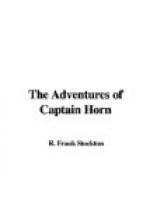Mrs. Cliff said no more, but she thought that was all very well for Edna, who was enjoying herself in a way that suited her, but it was very different for her.
In her heart of hearts, Mrs. Cliff now believed they would never see Captain Horn again. “For if he were alive,” she said to herself, “he would certainly have contrived in some way or other to send some sort of a message. With the whole world covered with post routes and telegraph-wires, it would be simply impossible for Captain Horn and those two sailors to keep absolutely silent and unheard of for such a long time—unless,” she continued, hesitating even in her thoughts, “they don’t want to be heard from.” But the good lady would not allow her mind to dwell on that proposition; it was too dreadful!
And so Edna waited and waited, hoping day by day for good news from Captain Horn; and so Mrs. Cliff waited and waited, hoping for news from Captain Horn—good news, if possible, but in any case something certain and definite, something that would make them know what sort of life they were to lead in this world, and make them free to go and live it.
CHAPTER XXXII
A MARINER’S WITS TAKE A LITTLE FLIGHT
When Captain Horn, in the brig Miranda, with the American sailors Burke and Shirley, and the four negroes, left Acapulco on the 16th of September, he might have been said to have sailed “in ballast,” as the only cargo he carried was a large number of coffee-bags. He had cleared for Rio Janeiro, at which port he intended to touch and take on board a small cargo of coffee, deeming it better to arrive in France with something more than the auriferous mineral matter with which he hoped to replace a large portion of discarded ballast. The unusual cargo of empty coffee-bags was looked upon by the customs officials as a bit of Yankee thrift, it being likely enough that the captain could obtain coffee-bags in Mexico much cheaper than in Rio Janeiro.
The voyage to the Peruvian coast was a slow one, the Miranda proving to be anything but a clipper, and the winds were seldom in her favor. But at last she rounded Aguja Point, and the captain shaped his course toward the coast and the Rackbirds’ cove, the exact position of which was now dotted on his chart.
A little after noon on a quiet October day, they drew near enough to land to recognize the coast-line and the various landmarks of the locality. The negroes were filled with surprise, and afterwards with fright, for they had had no idea that they were going near the scene of their former horrible captivity. From time to time, they had debated among themselves the intentions of Captain Horn in regard to them, and now the idea seized them that perhaps he was going to leave them where he had found them. But, through Maka, who at first was as much frightened as the rest, the captain succeeded in assuring them that he was merely going to stop as near as possible to the cave where he had stayed so long, to get some of his property which it had been impossible to take away when the rest of the party left. Maka had great confidence in the captain’s word, and he was able to infuse a good deal of this into the minds of the three other negroes.




